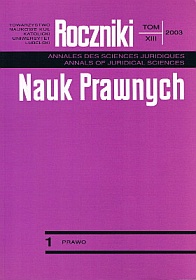Rights and Duties of the Parties of the Storing Contract
Abstract
By an Act of 16th November 2000 on the bonded warehouses and on the amendment of the Civil Code, the Civil Procedure Code and other acts, the institution of a warehouse was restored in the Polish legal system − after thirty five years of absence and years of discussions − as an entrepreneur running a company providing services of professional goods storage, authorized to issue a security – the warehouse receipt used to provide extra capital for the participants and to simplify the legal relations, and to sell the deposited goods in a public auction. The basic solutions accepted in the Act have been based on the assumptions worked out before the war, in particular on the basis of the Commercial Code which was in application (formally) until 1965.
The Act regulates the principles of operation of the warehouses – of running a warehousing company. It is associated with a richness of legal issues relating: control of conducting warehouses, supervision and operation of such warehouses, the chamber of warehouses, the warehouse guarantee fund, and the very activity of the warehouses, legal description of the warehouse receipts, as well as the new regulations of the warehousing contract in the Civil Code − introduced by the new regulations – which replaced the regulations that were not corresponding to the requirements of the modern economy.
Due to warehouse entrepreneurs the participants in the economic turnover do not need to invest into expensive storehouses, the commercial turnover is made easier, including sale on the commodities exchanges. Warehouses frequently provide overall services also consisting of reloading, sorting, weighing of goods – being equipped with the necessary technical infrastructure, human resources and theoretical preparation for such activities. The participants in the economic turnover, by depositing the goods in the warehouse, are able to perform a lot of operations and activities requiring professional service, including sale of goods, without the necessity to move the goods, which sometimes is expensive, or to pay the levies due.
The warehouse receipt – a security composed of two parts – the reverse (the certificate of title) and – the warrant (the warehouse pledge receipt) which can be assigned together, or each separately by endorse, is a new (returning to legal transactions) type of the commodity security. Warehouse receipts (in particular, the warrant) are the source of credit are to be used as another financial instrument.
By changing the warehousing contract, the legislator gave it a consensual character first of all and adapted its provisions to the needs of modern professional legal transactions.
Copyright (c) 2003 Roczniki Nauk Prawnych

This work is licensed under a Creative Commons Attribution-NonCommercial-NoDerivatives 4.0 International License.


